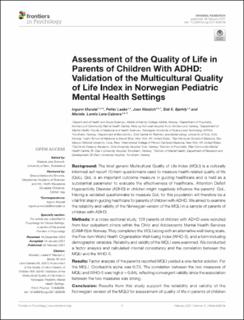| dc.contributor.author | Mundal, Ingunn Pernille | |
| dc.contributor.author | Laake, Petter | |
| dc.contributor.author | Mezzich, Juan | |
| dc.contributor.author | Bjørkly, Stål | |
| dc.contributor.author | Lara Cabrera, Mariela Loreto | |
| dc.date.accessioned | 2021-04-09T06:24:56Z | |
| dc.date.available | 2021-04-09T06:24:56Z | |
| dc.date.created | 2021-01-27T14:50:38Z | |
| dc.date.issued | 2021 | |
| dc.identifier.citation | Frontiers in Psychology. 2021, 12 1-10. | en_US |
| dc.identifier.issn | 1664-1078 | |
| dc.identifier.uri | https://hdl.handle.net/11250/2736982 | |
| dc.description.abstract | Background: The brief generic Multicultural Quality of Life Index (MQLI) is a culturally informed self-report 10-item questionnaire used to measure health-related quality of life (QoL). QoL is an important outcome measure in guiding healthcare and is held as a substantial parameter to evaluate the effectiveness of healthcare. Attention Deficit Hyperactivity Disorder (ADHD) in children might negatively influence the parents’ QoL. Having a validated questionnaire to measure QoL for this population will therefore be a vital first step in guiding healthcare for parents of children with ADHD. We aimed to examine the reliability and validity of the Norwegian version of the MQLI in a sample of parents of children with ADHD. Methods: In a cross-sectional study, 128 parents of children with ADHD were recruited from four outpatient clinics within the Child and Adolescents Mental Health Services (CAMHS) in Norway. They completed the MQLI along with an alternative well-being scale, the Five-item World Health Organization Well-being Index (WHO-5), and a form including demographic variables. Reliability and validity of the MQLI were examined. We conducted a factor analysis and calculated internal consistency and the correlation between the MQLI and the WHO-5. Results: Factor analysis of the parents reported MQLI yielded a one-factor solution. For the MQLI, Cronbach’s alpha was 0.73. The correlation between the two measures of MQLI and WHO-5 was high (r = 0.84), reflecting convergent validity since the association between the two measures was strong. Conclusion: Results from this study support the reliability and validity of the Norwegian version of the MQLI for assessment of quality of life in parents of children with ADHD with good psychometric properties. Study findings support the use of the questionnaire in CAMHS. | en_US |
| dc.language.iso | eng | en_US |
| dc.publisher | Frontiers | en_US |
| dc.relation.uri | https://doi.org/10.3389/fpsyg.2021.638006 | |
| dc.rights | Navngivelse 4.0 Internasjonal | * |
| dc.rights.uri | http://creativecommons.org/licenses/by/4.0/deed.no | * |
| dc.title | Assessment of the quality of life in parents of children with ADHD : validation of the Multicultural Quality of Life in Norwegian pediatric mental health settings | en_US |
| dc.type | Peer reviewed | en_US |
| dc.type | Journal article | en_US |
| dc.description.version | publishedVersion | en_US |
| dc.source.pagenumber | 1-10 | en_US |
| dc.source.volume | 12 | en_US |
| dc.source.journal | Frontiers in Psychology | en_US |
| dc.identifier.doi | 10.3389/fpsyg.2021.638006 | |
| dc.identifier.cristin | 1880465 | |
| cristin.ispublished | true | |
| cristin.fulltext | original | |
| cristin.qualitycode | 2 | |

